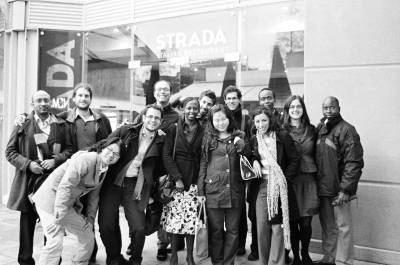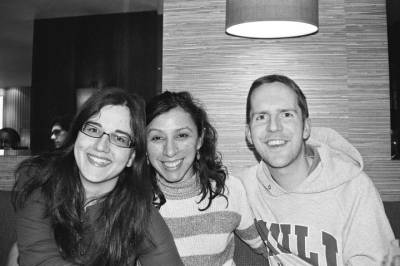What are your fondest memories of your time at Queen Square?
The time with my friends in the MSc Clinical Neurology course (2009-10). It was amazing to meet people from all around the world and share experiences from the academic, going to Gowers and trying to guess the diagnosis, to the social, going to the pub after exams. These are the fondest memories that will live with me forever. Queen Square is such a special place in the heart of London, and I had the feeling of being a citizen of the world, with friends from such different backgrounds, for whom being at Queen Square meant such different things - we came together with different dreams and this made the experience very special.

We shared this passion for Neurology and an innate curiosity. The challenge of being with lecturers, who you used to know only from their research papers, and being welcomed by them was another highlight.
One moment I would like to highlight is the way that David Blundred and Daniela Warr welcomed students from across the world, and appreciated the difference between students. During the MSc, students had the option to choose rotations in sub-specialities. I had an interest in Stroke, felt I was weak on that area and wanted to spend time in HASU. As it happened we had too many students who wanted to do Stroke: 7 students with only 6 places. David came to me, as other students, from Africa and Asia, had strong reasons to want an attachment with the Stroke team, for example to establish a stroke unit. David recommended that I consider Neuro-ophthalmology and an attachment with Dr Gordon Plant. I remain very thankful for the suggestion – this was a life changing event for me! I enjoyed clinics from the first day, discussing cases, etc, and when I completed the MSc I had a project that would become a PhD. I thank David for his sensitivity and in recognising the differences and challenges for each student – everyone was from very different backgrounds and I was very impressed and thankful.

Who are the people that have inspired you the most throughout your career?
A lot of people influenced me throughout my career and at different times of my life. I had experience in France before Queen Square and Brazil as well. I was very much influenced by a Neurologist in France, Patrick Verstichel, who has a special interest in Cognitive Neurology and Epilepsy. Observing the way he took a history, the way he listened to patients, and his fascination with the brain and the human aspects of Neurology. He was someone who shone a light into Neurology for me. Later in Brazil, I had the opportunity to work with Prof Ricardo Nitrini, a pioneer of Cognitive Neurology in Brazil, as well as Dr Sonia Brucki and Dr Valeria Bahia. They were very inspiring and the way they conducted clinical research in Brazil was very important to me in that field.
In the UK, it was my PhD supervisor, Dr Gordon Plant. He still inspires me in many things, from his deep knowledge of Neurology to the humble way he approaches patients in taking a history, to the way in which he shares knowledge and takes time to listen to others views. I remain incredibly thankful to have had the opportunity to work with him and he will continue to inspire me throughout my life. My PhD also gave me the opportunity to work with Merle James-Galton, who is a great neuropsychologist and participated with some of the fundamental research in visual cognition.
Tell me about your upbringing in Brazil?
I came from a rural background, in a remote village which was far from the big cities. My father was away for long periods (he worked as a gold miner) and I had a very difficult childhood in economic terms. However I benefitted from some dedicated and heroic primary teachers (they worked for virtually no money), whom I thank for having nourished in me the love of knowledge. I completed my primary education in this small village, and at the age of 13 I left to go to high school in a neighbouring city, which was very difficult. At 16 I moved to Sao Luis (a city in north-east Brazil) to face the challenge to go to university (which at that time seemed impossible for someone from my background – and I did not have any role models that I could look up to who had gone to University). During high school I had won a competition to work as a trainee in a bank, and this helped me to have some savings and which funded a trip to the capital of the state when I finished high school. This allowed me to fund myself and prepare for university – along with support from my parents and friends. I was successful in my application and initially started on a Pharmacy course and in the following year moved (through another competition) to Medicine. Later I studied Psychology, but in the end I realised I was more suited to medicine once I started seeing patients. I have always had a humanistic approach to science.
After graduating with a medical degree I Initially thought of Psychiatry but as I found out more about Neurology the more I became interested in the subject. I had the opportunity to go to France as an observer, and then as a trainee. Back in Brazil I completed Neurology training.
Since leaving Queen Square what have you be working on?
I am a Consultant Neurologist in Brazil and my clinic has a special interest in Cognitive Neurology and Neuro-psychiatry. Colleagues refer patients to me who fit into these areas and I do see general Neurology patients as well. I work in both the private and public sectors (psychiatric hospital) and help in the education of residents at this hospital. It has been a great experience.
Once a month I go to the small town where I grew up (Formosa da Serra Negra), where I see all kinds of patients, a mix between Neurology and Psychiatry (this is one area that makes me feel more useful to people). I have realised that by being able to conduct a neurological examination you can help more people. We don’t have specialists working in remote places and GPs tend not to have a deep knowledge of Neurology. By being able to make sense of imaging, history and examination, you are able to help and make a difference, which is where you realise that clinical expertise and skills still matter. Having been abroad, then and coming back to where I grew up, listening to people and sharing what I have learned is a very rich experience.
Is there any area of research that you are working on at the moment?
I have two main interests. One follows on from the work I was doing in Queen Square in the field of Neuro-ophthalmology and the interface between this and Cognitive Neurology. I am mainly interested in PCA (posterior cortical atrophy) and Neurology of vision. The other area I have an interest in is Neuro-psychiatry (Neurological presentation of psychiatric diseases or psychiatric presentation of neurological disease) and I am endeavouring to have a collaboration with friends in Brazil; we are in the first stages of clinical research.
 Close
Close

